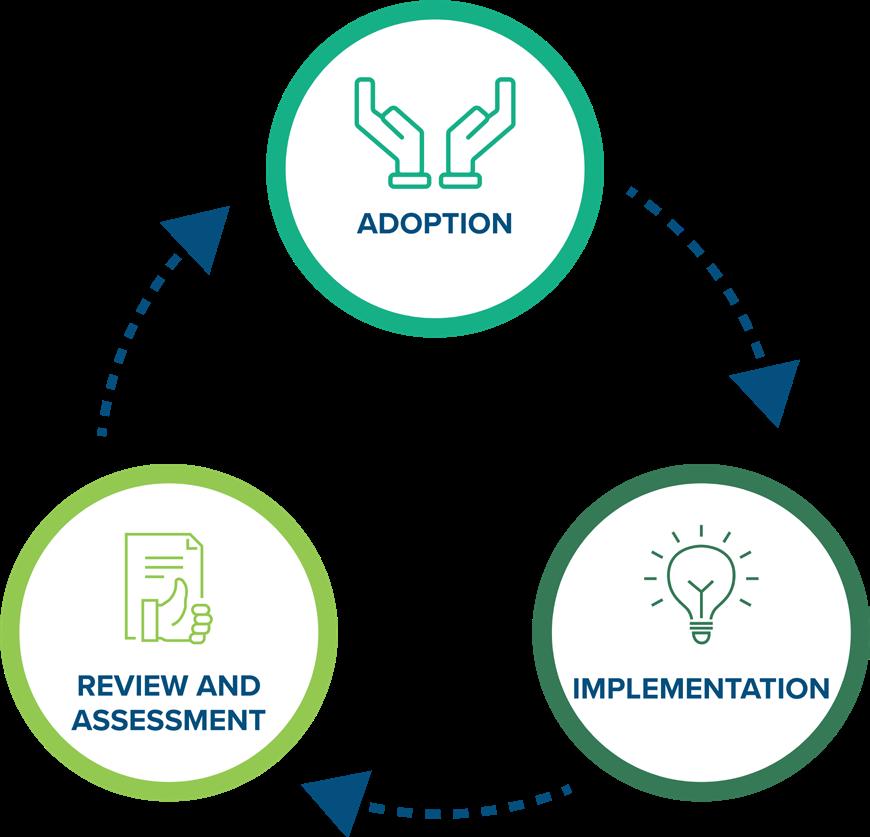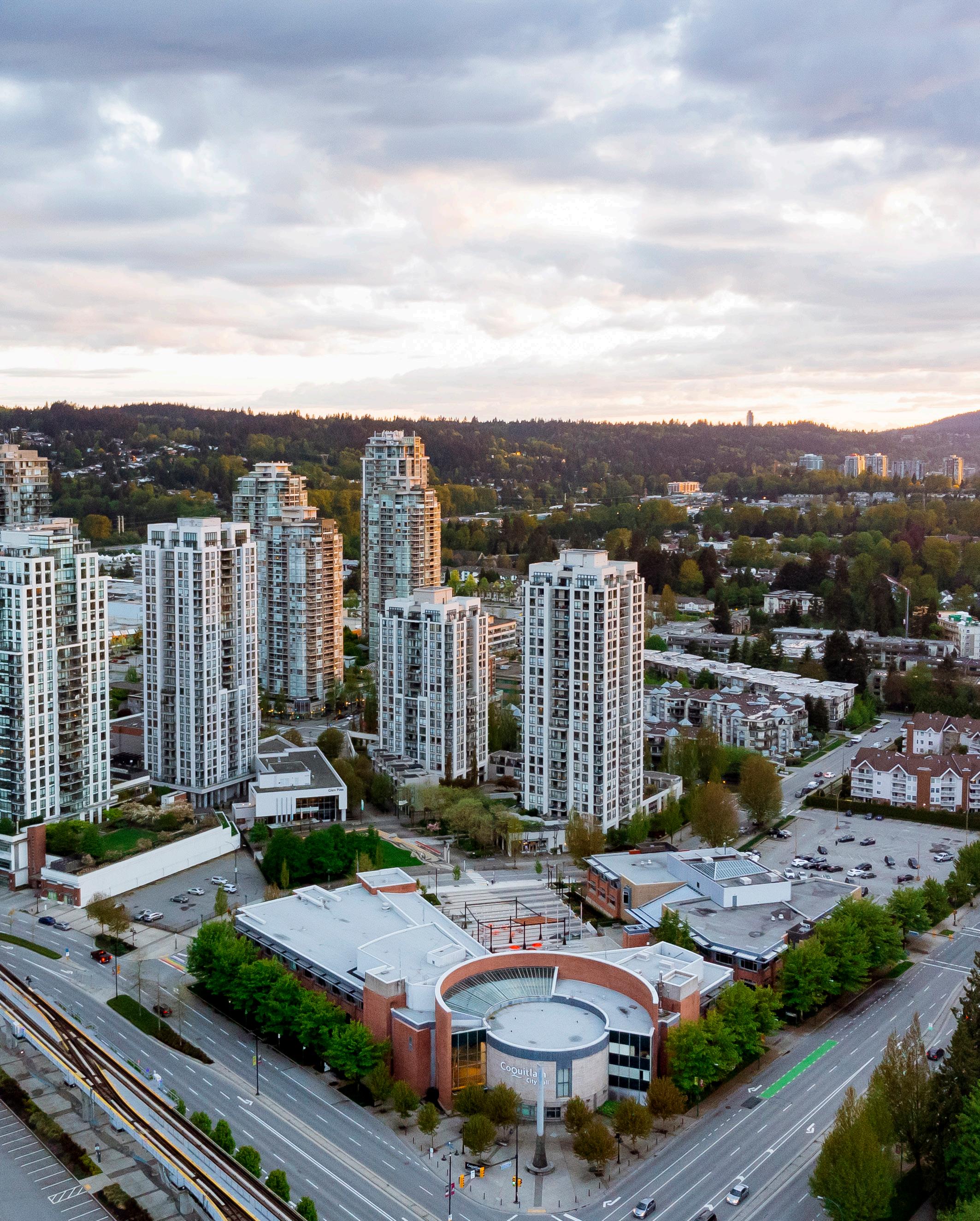Economic Development Strategy
Shared Prosperity, Responsible Future: Investing in People, Place and Partnerships




Shared Prosperity, Responsible Future: Investing in People, Place and Partnerships



The City of Coquitlam is an ambitious and amenity rich community in the heart of the Metro Vancouver region in British Columbia. With its historical connections to the land and access to vibrant natural and cultural amenities, Coquitlam is widely regarded as a desirable place to live, work and do business. Centrally located and linked by rapid transit with a diverse and highly educated local population, Coquitlam offers a unique mix of features and characteristics popular with families. The City’s multicultural and welcoming spirit is attractive to talent and supports the growth of local businesses, while also attracting investment and innovation from entrepreneurial newcomers.
Working towards its vision of a responsible future with shared prosperity for all residents, these factors present opportunities for Coquitlam to build something special, and distinguish itself as a regional economic and cultural hub north of the Fraser River.
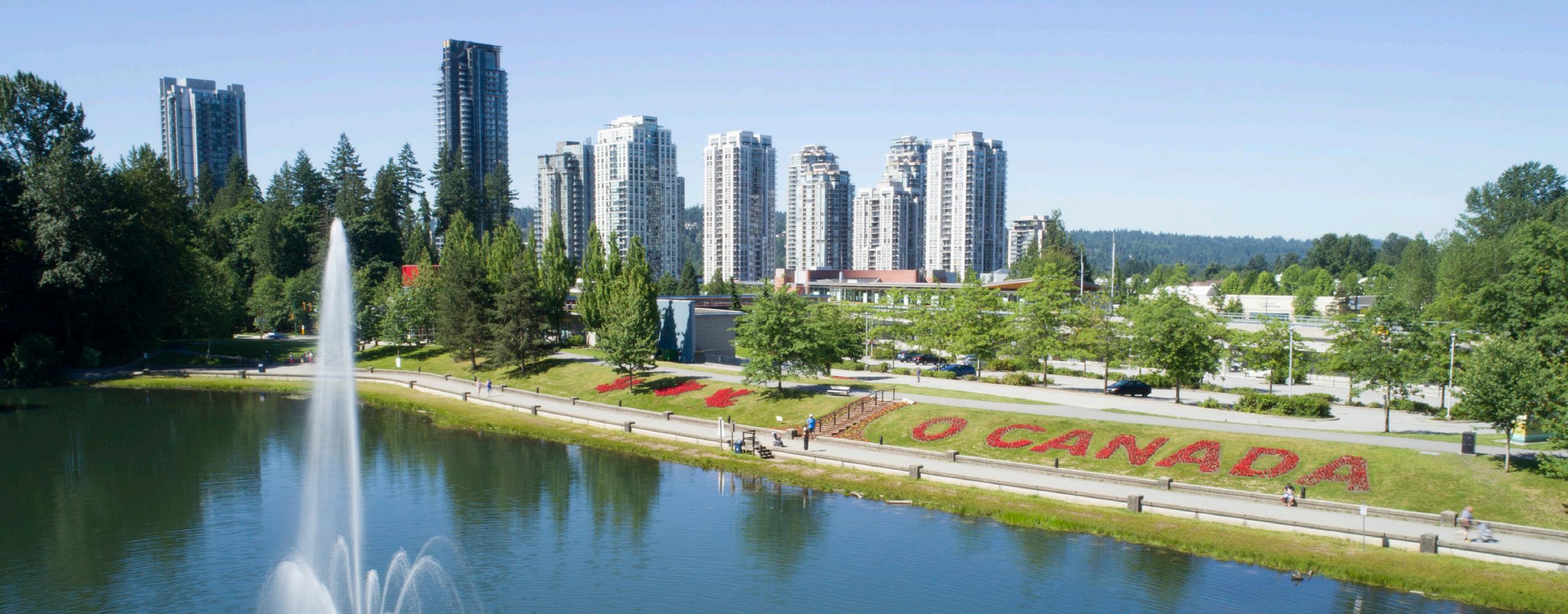
We acknowledge with gratitude and respect that the name Coquitlam was derived from the hənqəminəm word kʷikʷəƛəm (kwee-kwuh-tlum) meaning
“Red Fish Up the River”. The City is honoured to be located on the kʷikʷəƛəm (Kwikwetlem) traditional and ancestral lands, including those parts that were historically shared with the sqəciyaɁɬ təməxʷ (Katzie), and other Coast Salish Peoples.
This Economic Development Strategy (EDS) serves as a forward-looking vision and policy guidance document for the City of Coquitlam for the next five years (2023 to 2027) supporting the development of a resilient and sustainable economy that works for everyone. The EDS represents the culmination of comprehensive community engagement, research, and quantitative and qualitative analysis, all of which were used to identify a set of goals, strategies and actions that support the realization of that economic vision. This Strategy will guide efforts to attract new investment and support and grow existing businesses with detailed reporting on individual components of the strategy provided in the accompanying Appendices.
Economic activity is integral to complete and resilient communities, providing a range of goods, services, community employment opportunities, social and cultural fabric, and overall quality of life. There are many factors which contribute towards the health of the local economy, including:
As of the 2021 Canadian Census, the City of Coquitlam served as home to 148,600 people, while accommodating 62,300 jobs. This accounts for 5.6% of the total population of Metro Vancouver, and 4.7% of all jobs in the region.



The EDS aligns and complements the existing economic policies and goals of the Citywide Official Community Plan (CWOCP) and corporate Strategic Plan, as well as those present in many other City plans, bylaws, strategies and policies. In some cases existing documents and policies will need to be updated over time to ensure they fully align with the goals and strategies presented in the EDS. The City’s planning framework is illustrated in the figure below. The EDS is an official city-wide economic guide with supporting studies intended to be reviewed on a five-year cycle.

Did you know?
Metro Vancouver is the third-largest metropolitan area in Canada in both population and economic activity, after only Toronto and Montreal. Accounting for over 60% of the province’s GDP, and 50% of its total population, the region also serves as the industrial, commercial and financial heart of British Columbia.

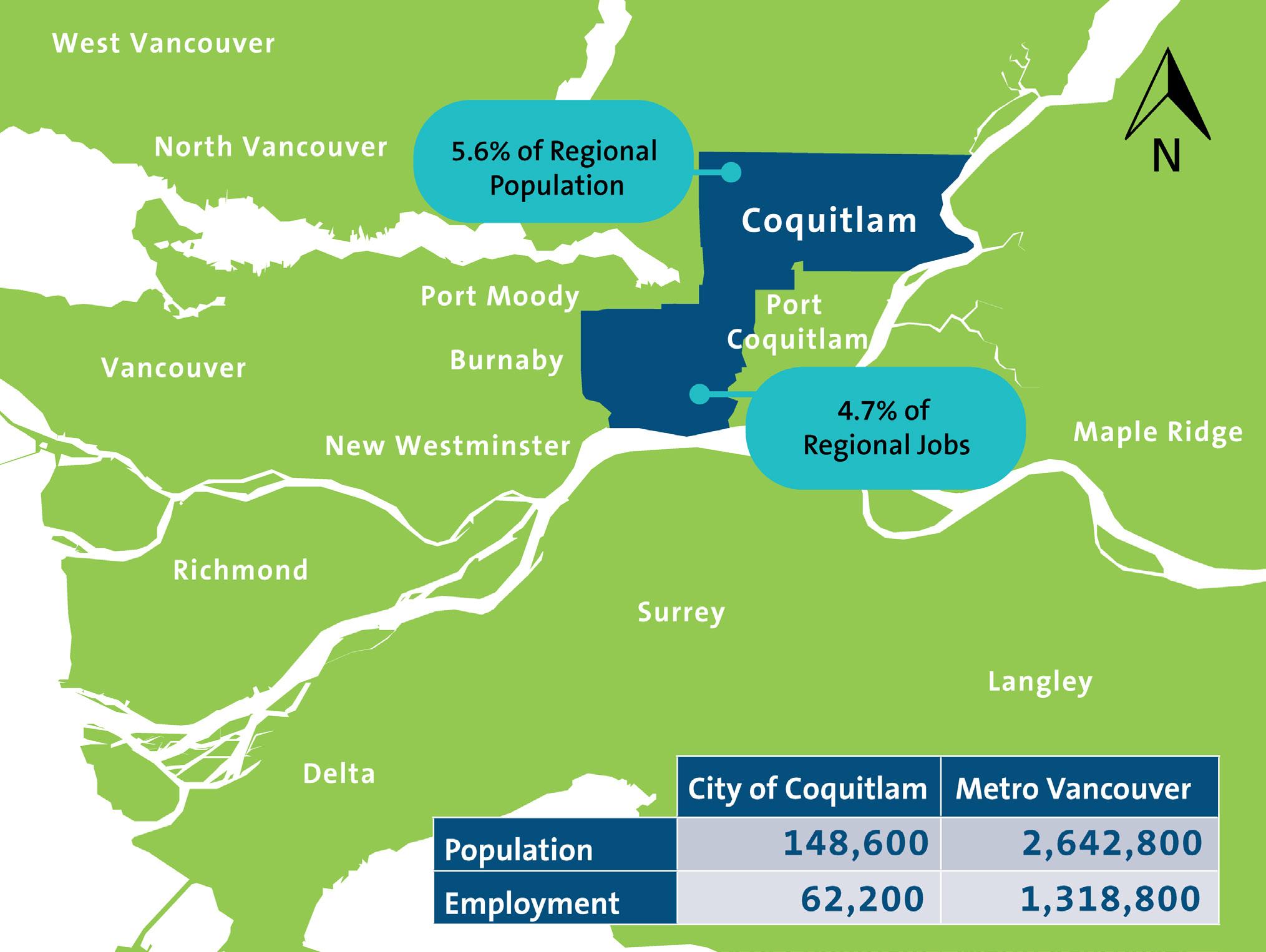
The economic vision presented in this Strategy was the result of comprehensive community engagement, which served as the basis for understanding the needs, priorities, and aspirations of diverse voices across Coquitlam. This engagement campaign was undertaken over the summer of 2022 and incorporated input from across the community, including City Council, Economic Development Advisory Committee, neighbouring First Nations Economic Development organizations, youth, Tri-Cities Chamber of Commerce, local businesses, and members of the public. Elements of the engagement campaign included a project website, a public survey of Coquitlam residents and business owners, targeted interviews with key stakeholders and subject matter experts, workshops with Coquitlam City Council, presentations to relevant Coquitlam Council Advisory Committees, and regular project engagement with key local business groups and the municipal staff project advisory team. Feedback from each of these sources provided a foundation for the development of the EDS, and informed both the vision for the Strategy, along with actions.
Did you know?
56% of surveyed business owners reported Coquitlam above average compared to other municipalities in the region in terms of business friendliness.


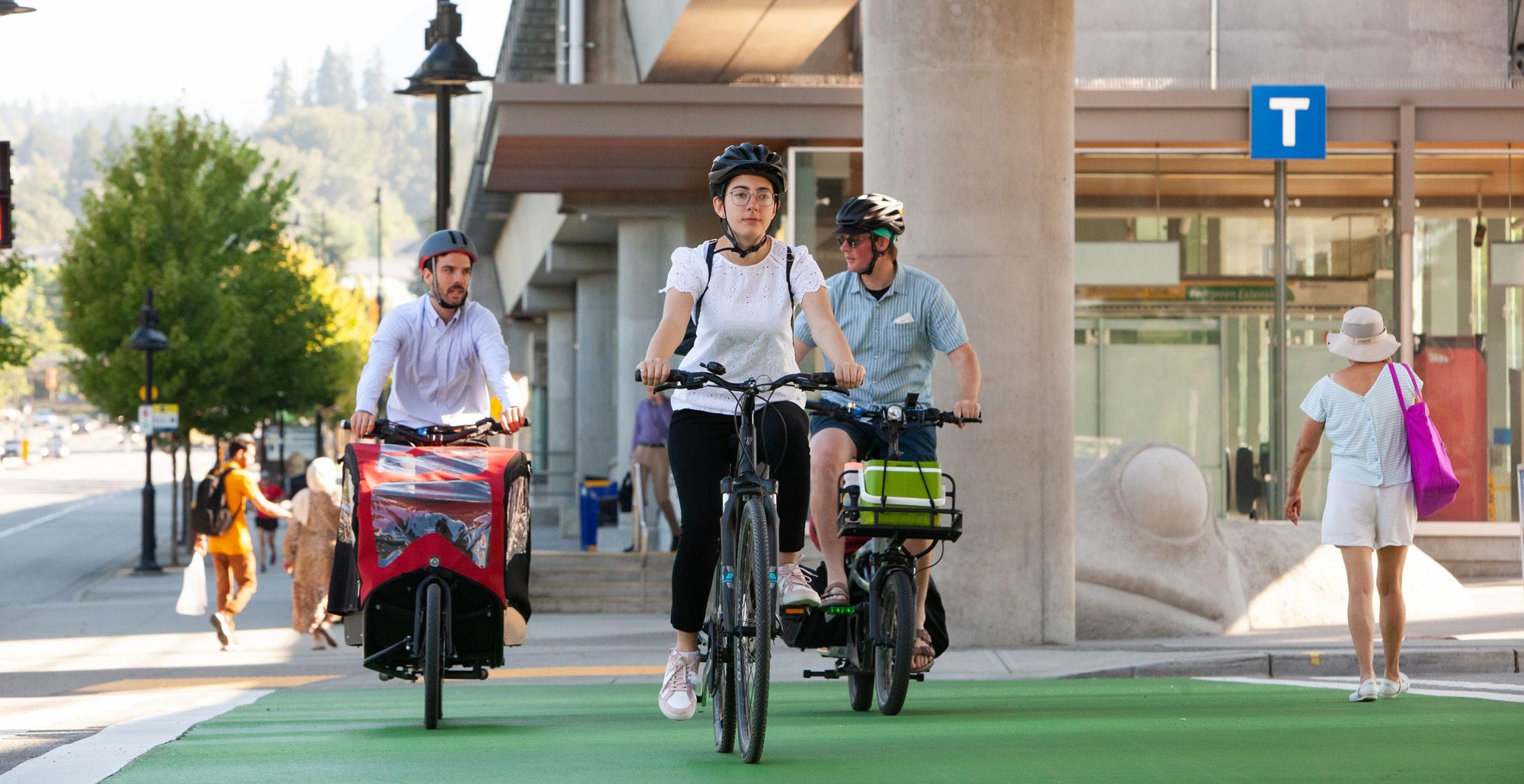
Through the engagement process, two key values were identified by Council and the community: Responsible Future and Shared Prosperity. These two principles serve as the foundation to the EDS, informing the Goals, Strategies and recommended Actions that follow.

Building a complete and resilient community in a responsible and sustainable manner. Considering the needs of current and future residents, workers and businesses in partnership with the community as well as regional and First Nations neighbours, while balancing environmental, social and economic needs.

Building a community that is welcoming, safe, diverse, inclusive and livable. By considering people across the economic spectrum we attract the best and the brightest. Working in partnership with the community, regional and First Nations neighbours, to maximize opportunities for engagement, collaboration, and quality employment opportunities in economic uplift.
Building from the Values, the EDS is organized into three key Themes: Place
Be a leader in providing diverse and accessible local employment opportunities.

Advance Coquitlam’s capacity to accommodate shared economic opportunities.
Strengthen and leverage partnerships with and between community members and other orders of government to support community vibrancy, business resiliency and affordability.
Did you know?
Coquitlam is a desirable place to raise a family. The average age of Coquitlam residents skews younger than the Metro Vancouver regional average with more children and middle-aged adults. Those middle-aged adults indicate a strong working age demographic.
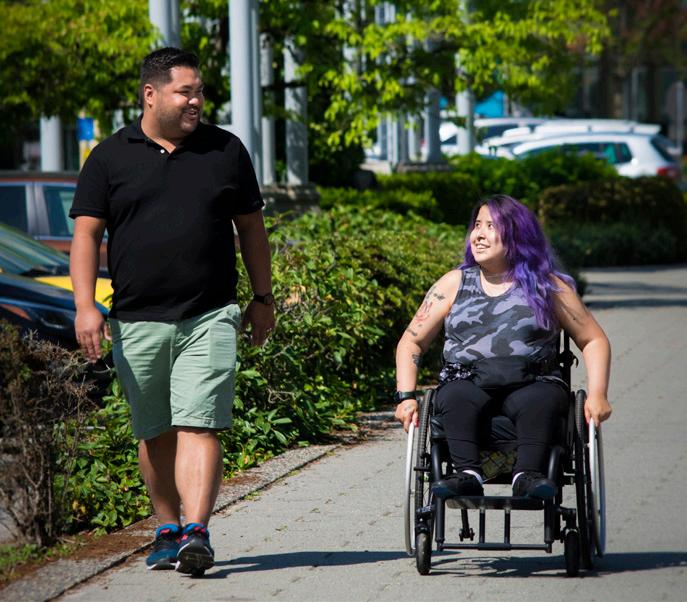
In each of the three Themes, nine overarching Goals were identified through engagement. These Goals, in turn, are supported by a range of Strategies and Actions that provide a roadmap for the implementation of the EDS over the years to come. Each of these features was informed by research and analysis conducted over the course of the Strategy development as detailed in the Appendices. An overview of the EDS structure at a glance is provided in the figure below.
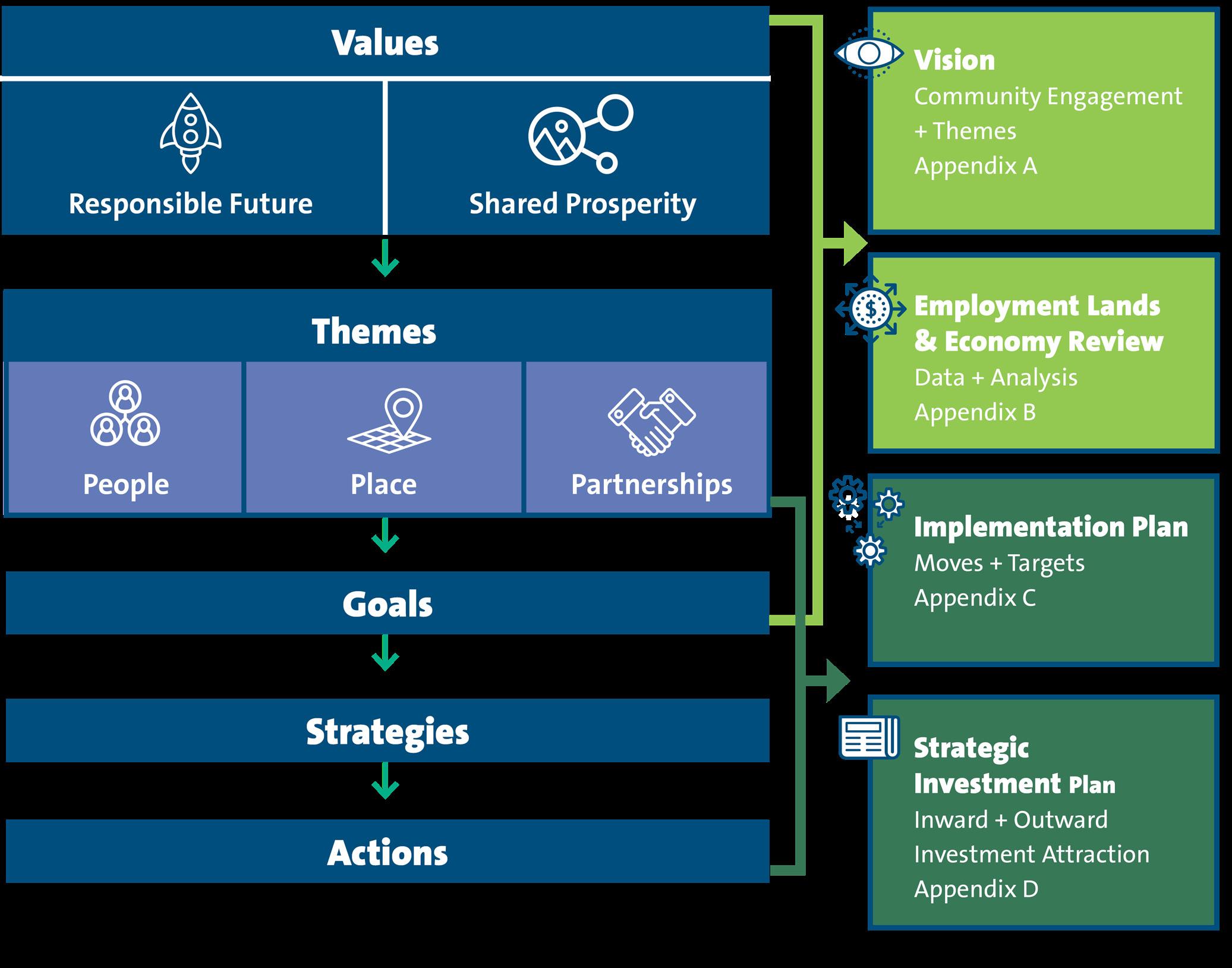

A leader in providing diverse and accessible local employment opportunities
At its core, Coquitlam’s economic prosperity is rooted in the people that live and work in the community. Coquitlam supports employment opportunities, promotes business development, and encourages opportunities for education and innovation to attract the best and the brightest.
The Goals and Strategies supporting People include:
Grow and attract businesses and employment opportunities in Coquitlam.
– Promote Coquitlam as a business-friendly complete community that provides local jobs for residents.

– Support the expansion of existing businesses to encourage business development and employment growth.
– Accelerate focused investment to grow sustainable local economic clusters to leverage Coquitlam’s strength in creative, tech and visitor economy sectors.
Did you know?
Between 2020 and 2050, Coquitlam is projected to be the fastestgrowing community in Metro Vancouver in terms of employment (+32,800 or 56%), and second fastest in terms of population (+94,900 or 59%).
Position Coquitlam for resiliency and adaptability to the changing nature of business and employment needs.
– Ensure land use policies enable a range of business and employment activities in appropriate locations.
– Promote the development of affordable spaces for people to work and live in Coquitlam.
– Expand data tracking to better understand the changing nature of work and business needs.
Expand links between local employers, education programs, and the community.
– Work with government, institutional and business partners to ensure that local institutions are offering the kinds of skills training and educational programs that meet the needs of the local economy.
– Retain and grow existing post-secondary education programs and institutions, while also attracting new institutional partners to serve the local community.
– Promote local opportunities for innovation and entrepreneurship within the community.
Advance Coquitlam’s capacity to accommodate shared economic opportunities
Coquitlam is leveraging its strategic advantages to distinguish itself as a vibrant economic and cultural hub north of the Fraser River. The community offers diverse, accessible and well-connected locations for employers to invest and grow their businesses, and a regional destination for visitors by supporting placemaking efforts and fostering a unique local identity for business and innovation.
The Goals and Strategies supporting Place include:
Goal A Strategies
Develop Coquitlam’s identity as a regional cultural and economic hub north of the Fraser River.

– Leverage Coquitlam’s natural and cultural amenities to market the city as an attractive and desirable location.
– Ensure that neighbourhoods are well connected to employment clusters and nodes.
– Connect, support, and promote creative industries, cultural events, festivals and tournaments.
Did you know?
Located on Burnaby Mountain, with easy access to Coquitlam, Simon Fraser University has consistently been ranked as the number one comprehensive university in Canada by Maclean’s annual rankings for 14 of the past 15 years.
Goal B
Establish Coquitlam’s City Centre as a fully integrated regional employment cluster and service center.
– Encourage the continued development of major office space in the City Centre.
– Work with partners to attract and accommodate major employers and institutional uses into the City Centre.
– Ensure the continued development of high quality and accessible public spaces and amenities.
– Promote the development of additional amenities and business supporting businesses, including additional entertainment and lodging options.
Goal C
Support a healthy supply of employment lands and spaces.
Strategies
– Preserve existing employment lands and encourage further intensification of productive employment spaces.
– Ensure the replacement of existing employment spaces as a condition of mixed-use development.
Did you know?
With a campus in Coquitlam’s City Centre, Douglas College is the largest public degree-granting college institution in the province providing diverse learning and skills training opportunities including life science, business, and high-tech.
Strengthen and leverage partnerships with and between community members and other orders of government to support community vibrancy, business resiliency and affordability
The success of Coquitlam’s economic development extends beyond that of the municipal government itself. Partnerships with and between other orders of government, neighbours and other organizations nurture a social fabric that is stable, reliable and forward-thinking. The collaborative approaches to community economic capacity development help to establish a positive and nimble environment for resilient economic growth, and a culture of excellence and innovation in city governance.
The Goals and Strategies supporting Partnerships include:
Goal A Strategies
Offer a competitive mix of infrastructure, services, policies, supports, and incentives to ensure Coquitlam is an attractive place to live and work.
– Provide services to attract and grow business uses that align with Coquitlam’s economic vision.
– Ensure Coquitlam presents a competitive offering amongst regional municipal options.
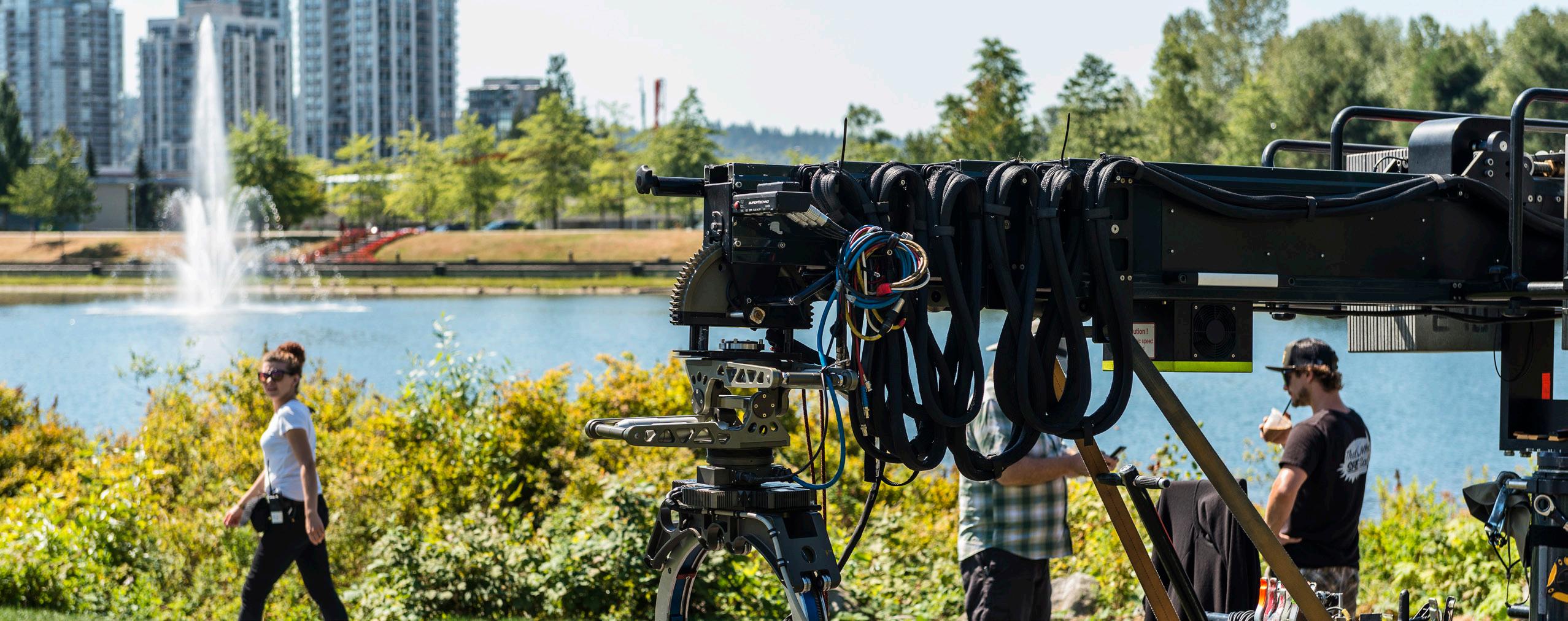
Engage and collaborate with local First Nations economic development.
Did you know?
The Coquitlam theatre and arts scene flourishes year round with a jam-packed calendar of live music, theatrical performances, art exhibitions and workshops. For more, go to visitcoquitlam.ca
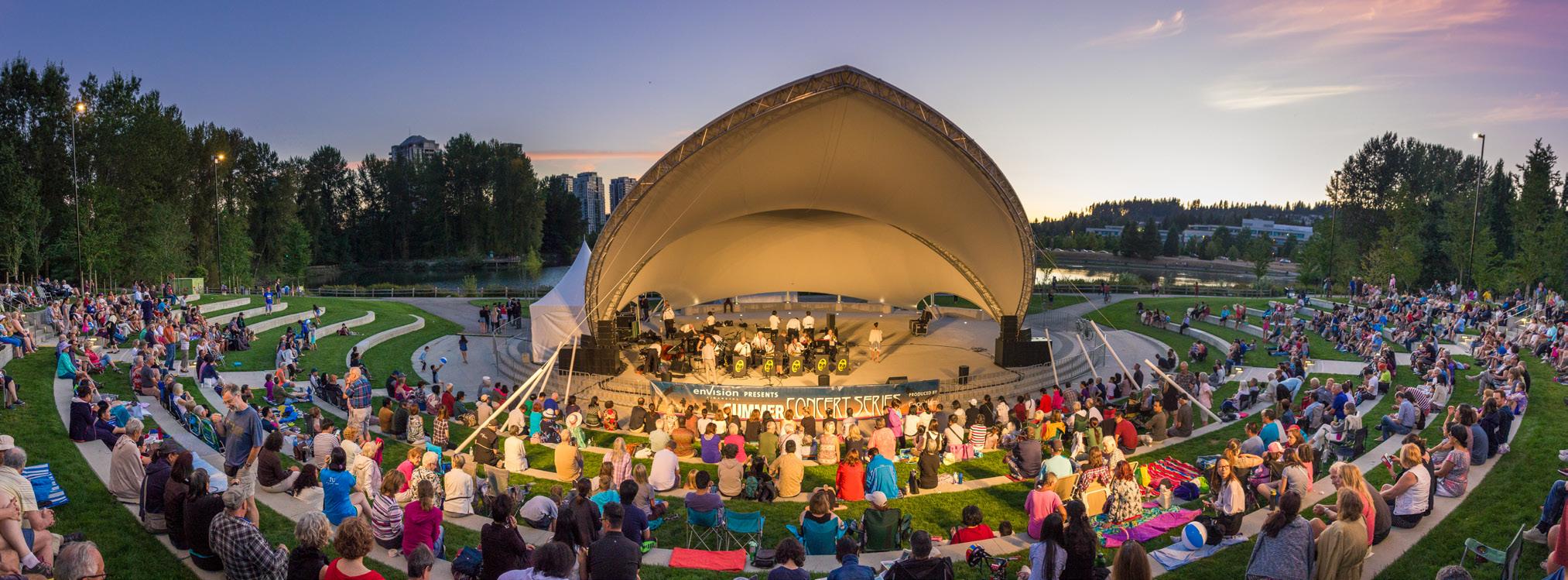
– Partner with kʷikʷəƛəm (Kwikwetlem) First Nation Enterprises (KFNE), Katzie Development Limited Partnership (KDLP), and other Coastal Salish peoples towards economic reconciliation and local employment opportunities.
– Ensure that the history and contributions of First Nations peoples are considered, respected and reflected.
Support local capacity building for community organizations focused on business improvement.
– Leverage existing partnerships, including with the Tri-Cities Chamber of Commerce, and support new engagements to help market and promote Coquitlam as a desirable business location, and to establish a unique and authentic local identity.
– Support the establishment of new grass roots community economic development organizations, partnerships, and programs.
Strengths & Opportunities
– Natural and cultural amenities

– Globally recognized post-secondary opportunities
I love the seasonal cultural activities that Coquitlam is known for, like the Lafarge lights.
- Survey respondent
– Diverse locations and infrastructure for media production
– Established multicultural business clusters
– First Nations partners
– Growing cluster of Food and Nutrition and Advanced Manufacturing focused businesses
– Emerging regional hub for business and entertainment
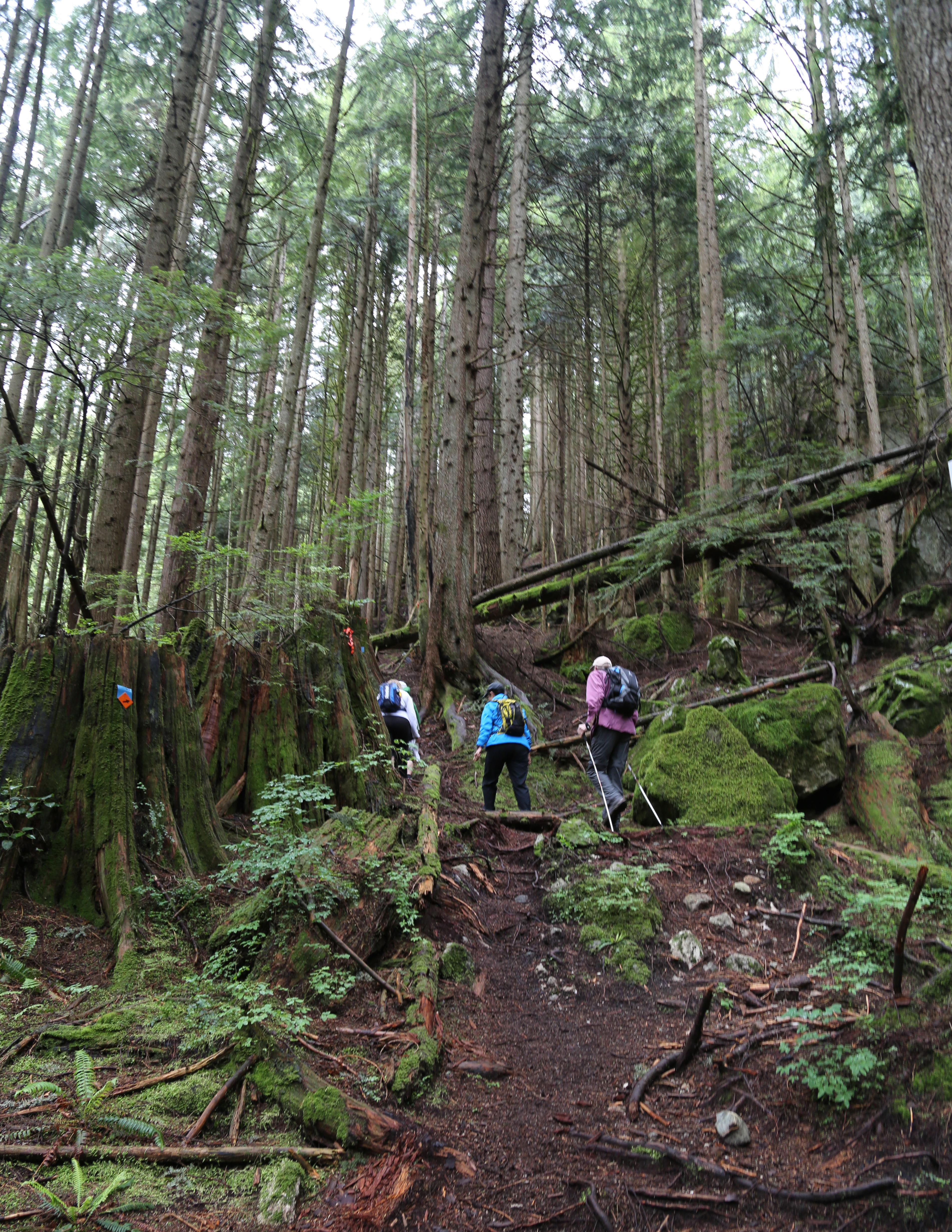
Coquitlam supports local business growth and favourable business environment by investing in world-class infrastructure and municipal services, supporting high quality of life, and nurturing local talent.

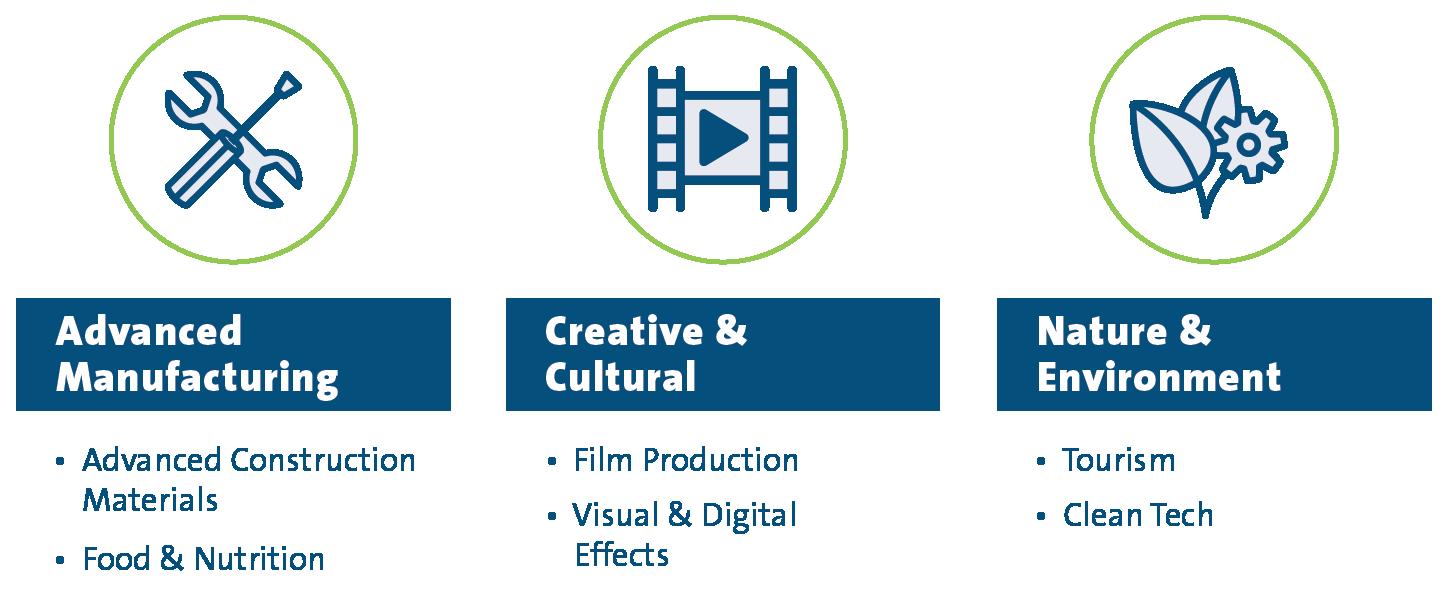
Investment trends point to the sectors of focus outlined above, in which Coquitlam has competitive advantage for attracting businesses and investment.

The Strategy makes the following alignment recommendations to maximize Coquitlam’s competitive advantages when competing for investment:
– Undertake a marketing and outreach strategy promoting strengths and vision.
– Focus messaging on Coquitlam’s role as an emerging cultural and economic hub on the edge of nature.
– Tailor approaches for different audiences and investment sectors, with general trends leveraging Coquitlam’s location, quality of life and multi-cultural labour force.
Did you know?
– Continue to strengthen local business environment via supportive policies, services and resources.
– Leverage success of existing firms to create local momentum.
– Investigate opportunities to strengthen ties between businesses and post-secondary institutions to provide youth and newcomers with resources to meaningfully participate in local workforce.
– Ensure local land use and tax policies are not hindering efficient redevelopment of remaining employment lands.
– Identify any opportunities to improve transparency and predictability of redevelopment process.
– Consider where promotional efforts or potential incentives may be appropriate for targeted employment sectors or uses.
Metro Vancouver is frequently cited as a competitive location for attracting both investment and talent in a global context, with Federal, Provincial and regional governments placing a high priority on supporting economic growth.
Building on strong foundation of location and livability, the EDS provides a roadmap for Coquitlam to realize its vision of a Responsible Future and Shared Prosperity. By focusing on the themes of People, Place and Partnerships, the community is well positioned to distinguish itself as a resilient and regionally competitive hub of economic and cultural activity.

Growing a resilient and inclusive economy is a collaborative effort, which will require both internal corporate and external community focus, effort, and resources. Residents, businesses and community partners all play integral roles in supporting the promotion of local economic opportunities. Coquitlam welcomes all to the table as we set out on this journey over the next five years.
The EDS is intended to be a nimble living document. The key actions of the EDS will be implemented over the next five years, with high-level tracking and monitoring throughout to assess progress, and make realignments if required. At the end of the five-year period, the strategy will be subject to assessment and review to ensure the recommendations and directions remain relevant and appropriate.
For additional supporting information on the EDS, please refer to the Appendices, or visit the City’s website coquitlam.ca/eds.
